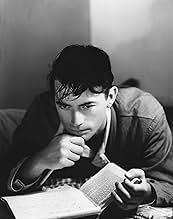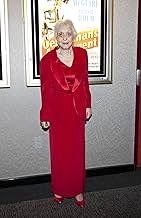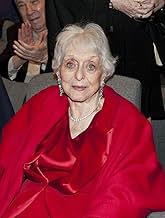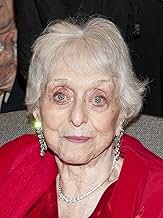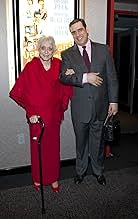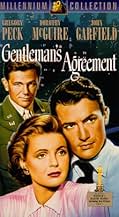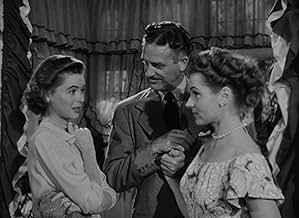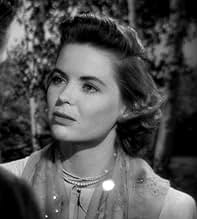एक पत्रकार यहूदी-विरोधी होने की कहानी को कवर करने के लिए यहूदी होने का दिखावा करता है, और व्यक्तिगत रूप से कट्टरता और घृणा की वास्तविक गहराई का पता लगाता है.एक पत्रकार यहूदी-विरोधी होने की कहानी को कवर करने के लिए यहूदी होने का दिखावा करता है, और व्यक्तिगत रूप से कट्टरता और घृणा की वास्तविक गहराई का पता लगाता है.एक पत्रकार यहूदी-विरोधी होने की कहानी को कवर करने के लिए यहूदी होने का दिखावा करता है, और व्यक्तिगत रूप से कट्टरता और घृणा की वास्तविक गहराई का पता लगाता है.
- निर्देशक
- लेखक
- स्टार
- 3 ऑस्कर जीते
- 17 जीत और कुल 9 नामांकन
- Bill Payson
- (as Ransom M. Sherman)
- Waiter
- (बिना क्रेडिट के)
- Nightclub Patron
- (बिना क्रेडिट के)
- Mother
- (बिना क्रेडिट के)
फ़ीचर्ड समीक्षाएं
Released the same year and touching on the same subject was Edward Dmytryk's Crossfire, which dealt with anti-Semitism at its extremes: murder with anti-Semitism as the motive. Gentleman's Agreement takes a more humanistic and subtle approach--one that is too subtle at times. Where Crossfire dropped the bomb of anti-Semitism into the laps of the audience, Gentleman's Agreement gives it to you in periodic shots in the arm in the form of a sermon, and each one says the exact same thing: anti-Semitism is bad. (But we knew that.) Yes, the message is an important one, but feeding it to the audience in a manner that is literally shoving it down our throats every few minutes doesn't help the digestion any.
Also lacking in Gentleman's Agreement is a three-dimensional protagonist. Peck's crusading writer who masquerades as a Jew is simply too zealous and unswerving for his own good. He has no faults, no inner conflicts and no doubts about himself. Whether he's being shunned by bigots or Dorothy McGuire, he's such a straight-shooter you know what he's going to do before he does: the right thing right away.
There's no real dramatic arc in the story, with the entire weight of the movie resting on the torrid on-again-off-again love affair between Peck and McGuire. She symbolizes the hypocrisy and passiveness of the everyday American on anti-Semitism, and he points it out to her every chance he gets-and that's all. It pretty much rambles on the same dramatic level all throughout the picture, dividing its time between love scenes and sermons, most of which are indistinguishable from one another.
In the end, the important message and the overall entertainment value of the picture suffers from this redundancy.
An interesting and rabid attractive drama in which a reporter pretends to be a Jewish in order to cover a story on anti-Semitism , only to find the masquerade entailing a backlash of grief and pressure for himself and his own family . Archetypical Hollywood social comment and the 20th Century Fox studio's fondness for realism looks remarkable dated in places . However , relying heavily for complicated loving relationships , tension and on a handful of attractive dramatic pieces and offering an important analysis of the problem . This sentimental and muddled film was Hollywood's first major attack on anti-Semitism. A successful movie that received 8 Oscar nominations and three wins, including Kazan's first for Best Director. Gregory Peck gives a terrific acting in an upright role similar to Atticus Finch , he is a journalist who has to deal with both overt and covert prejudice . John Garfield has a small but essential role as Phil's Jewish friend Dave . Starring Gregory Peck and Dorothy McGuire are accompanied by a very good support cast , such as : Celeste Holm , Anne Revere , June Havoc , Albert Dekker , Jane Wyatt , Dean Stockwell and Sam Jaffe.
The film was compellingly made by Elia Kazan who did not get along with actor Gregory Peck ; as usual Kazan dealing with thoughful and provoking issues . In fact , his films were concerned with personal or social issues of special concern to him. Kazan writes, "I don't move unless I have some empathy with the basic theme." And this first such "issue" film was Gentleman's agreement (1947). It was followed by Pinky (1949), one of the first films in mainstream Hollywood to address racial prejudice against black people. A streetcar named Desire (1951), an adaptation of the stage play which he had also directed, received 12 Oscar nominations, winning four, and was Marlon Brando's breakthrough role. In 1954, he directed On the waterfront (1954), a film about union corruption on the New York harbor waterfront. In 1955, he directed John Steinbeck's East of Eden (1955), which introduced James Dean to movie audiences. Rating : 6.5/10 .Notable . Controversial in its day , yet still timely .
I recommend this film, but it won't be for everyone and many of us would rather just pass this one by. But we shouldn't even though it holds up this mirror making us feel guilty and uncomfortable. I should point out that the ending relating to the love interest in the story just doesn't work, but then that is not the purpose of the film. Prejudice, anti-Semitism and discrimination are, and these elements are worked out well. A disturbing but intelligent portrayal which is worth taking in for what it is worth.
It's 2021 as I write. I watched this movie last night for the simple reason that there was nothing else on tv worth watching at 1 AM other than reruns of The Monkees. Seeing as how I love The Monkees, it's weird that I chose to watch this movie instead. I think I know why though.
The description doesn't do this movie justice. I almost changed channels after reading it, but one of the early scenes caught my attention and every scene after kept it. The more I watched, the further from shore I walked until it was impossible to swim back.
I am 62 years old and more set in my way of thinking than any other white male Georgia boy there is. Or so I thought. Thank God I was wrong. Born and raised a small town Confederate Conservative. Nuff said? No. That's one of the truths of this movie. Watch it and quit putting people in the groups that even today's society say are morally correct. Lesson learned.
Just by being who I am and where I'm from, I know what it's like to be stigmatized.
I'm a racist. That's the box the world says I belong in. That's the label in big bold letters that I wear every where I go. I always took pride in knowing the label was wrong. From that day long ago when I made friends with the first black kid to be placed in my elementary school after segregation, I have lived my life riding a different wave. The road I took led me on different paths. Racist was the opposite of who I am. 62 years of living this life proved it. This movie made its way deep inside and for the first time I realized I have spent my life seeing my reflection in a fun house mirror. The image of my reflection was distorted. That's a hard truth to swallow. I knew everyone else was wrong, (yes you are), the reflection you see is warped, but mine? Yes. Even mine.
Watch this movie alone. Don't let anything disturb you. And hopefully you will see your true self for the first time. I did. Maybe it will change you. Hopefully, it did me. Time will tell.
If this movie is in book form, it should be required reading for every high school student. If not, it should be recommended that every college grad watch it before receiving their diploma. The world would be so much closer to God's intent if we did.
Oscars Best Picture Winners, Ranked
Oscars Best Picture Winners, Ranked
क्या आपको पता है
- ट्रिवियाIn 1984 Gregory Peck claimed to have been misquoted in a 1967 interview in which he said Elia Kazan was the wrong director for the film. The actor said, "That's a misunderstanding. I don't think there could have been a better director for the film. What I meant was that he and I didn't have a rapport; emotionally, we were not on the same wave length. I don't think that I did my best work for him. If I worked with him now--as a mature man--I think I would give him everything he would want."
- गूफ़Early on, when Phil reminisces about his Jewish friend, Dave, he looks into the mirror and assesses his own features as being consistent with those of the Jews. This reveals his own experiences of having been influenced by the false stereotype of there being a "Jewish look". This is antithetical to his attacking anti-Semitic thoughts and actions in others, throughout the film. This, however, should not be considered a "GOOF" as many people are guilty of hypocrisy.
- भाव
Kathy Lacey: You think I'm an anti-Semite.
Phil Green: No, I don't. But I've come to see lots of nice people who hate it and deplore it and protest their own innocence, then help it along and wonder why it grows. People who would never beat up a Jew. People who think anti-Semitism is far away in some dark place with low-class morons. That's the biggest discovery I've made. The good people. The nice people.
- क्रेज़ी क्रेडिटThe main title theme begins with the Fox logo, replacing the usual Alfred Newman fanfare.
- कनेक्शनFeatured in Precious Images (1986)
टॉप पसंद
- How long is Gentleman's Agreement?Alexa द्वारा संचालित
विवरण
बॉक्स ऑफ़िस
- बजट
- $19,85,000(अनुमानित)
- चलने की अवधि1 घंटा 58 मिनट
- रंग
- पक्ष अनुपात
- 1.37 : 1


